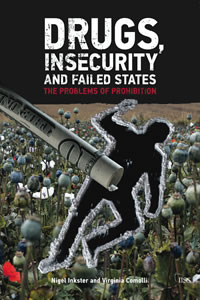With marijuana legalization initiatives heading to the ballot, some with a good chance of passage, and with growing international support for a real debate on prohibition, people are talking about drug policy like they never have before. Our new book offers will help you be part of that conversation, while our new video offer will remind you why we should be angry too.
Oregon's Measure 80 is the most far reaching of this year's legalization initiatives. It is also the longest shot.
NORML's 41st annual national conference took place in Los Angeles over the weekend. Discussion of pending marijuana legalization initiatives dominated the event.
Veteran antiwar activist Tom Hayden opened the first day of the national NORML conference with a call for the creation of a social justice-based peace movement to end the drug war.
The marijuana reform movement has found a most unlikely spokeswoman: A silver-haired octogenarian Texas Republican woman. But Ann Lee isn't just any silver-haired octogenarian Texas Republican woman.
There's less than a month to go, but some initiatives are more active than others.
The big news this week is that Oakland is suing the feds over their efforts to shut down Harborside. Meanwhile, the battles continue at the state and local level in California and beyond.
A state Health Department review of New Jersey's needle exchange program has found it is working and should be continued.
A San Diego housewife and an Arizona Border Patrol agent both died at the hands of Border Patrol agents in drug-related incidents in recent days, bringing this year's toll of drug war killings to 48.
Some Michigan narcs were up to no good, a New Mexico probation officer getscaught carrying pounds of weed, a New York City prison guard gets caught peddling pot and placebos (!) to prisoners, and a Florida cop gets caught stealing weed to use as probable cause for a search warrant. Just another week in the drug war.
Dear Drug War Chronicle reader:
With marijuana legalization initiatives heading to the ballot, some with a good chance of passage, and with growing international support for a real debate on prohibition, people are talking about drug policy like they never have before. And so two of our three new offers for donating members come from the academic world rather than activist reformer circles:
Marijuana Legalization: What Everyone Needs to Know and
Drugs, Insecurity and Failed States: The Problems of Prohibition.
This is also a time of continuing outrages in the government's drug war, including the federal campaign against medical marijuana. And so our third new offer is the DVD
Lynching Charlie Lynch, by director Rick Ray, telling the story of one of California's most respected and responsible medical marijuana providers, now facing time in federal prison. (Follow the three links above for Drug War Chronicle reviews of each of these works.)
Donate $35 or more to StoptheDrugWar.org, and you will be eligible for a complimentary copy of any one of these items. Donate $65 or more and you'll be eligible for any two. Donate $95 or more and you can receive all three. (Each of these items, and each combination along with other available items, can be found in the "membership premiums" section of our
online donation form, under the indicated minimum total.)
At a time like this -- when people are talking about drug policy like never before -- the movement's internet strategy is also more important than ever before. So please support our work with a generous donation by credit card or PayPal today. You can also donate by mail -- info below.
Lastly, please note that even with a nonprofit, bulk discount, we spend a significant amount to purchase these items and send them to you -- if you can afford to donate more than the minimum, or to supplement your donation with a continuing monthly contribution, I hope you'll consider doing so. If gift items are not important to you, I hope you'll consider sending a donation that's entirely for our work.
Donations to our organization can be made online at
http://stopthedrugwar.org/donate, or they can be mailed to: DRCNet Foundation (tax-deductible), P.O. Box 18402, Washington, DC 20036; or Drug Reform Coordination Network (non-deductible for lobbying), same address. (Contact us for information if you wish to make a donation of stock.)
Thank you for standing with us to stop the drug war's cruelties and meet the opportunity this time offers to make a brighter future. And don't get discouraged by the challenges our movement and the cause are currently facing:
Time, and the truth, are on our side!
Sincerely,

David Borden, Executive Director
StoptheDrugWar.org
Washington, DC
http://stopthedrugwar.org
back to top
Of the three marijuana legalization initiatives on the ballot this year, Oregon's Measure 80, also known as the Oregon Cannabis Tax Act, is the most radical. For a variety of reasons it also looks to be the least likely to win. In the only recent poll, done last month by SurveyUSA, Measure 80 was trailing by a margin of 37% to 41%, with a large undecided vote of 22%. While pollsters said the results meant the race was "could go either way" and campaign proponents pointed to the high number of undecideds, any initiative polling less than 50% this close to election day is in trouble.

Measure 80 aims to reassure parents. (vote80.org)
That's too bad, because Measure 80 would repeal marijuana prohibition in Oregon outright; allow personal possession and cultivation by adults 21 and over; create an Oregon Cannabis Commission to tax, regulate, and license commercial marijuana cultivation, processing, and sales; and explicitly allow for industrial hemp production.
Unlike Washington's I-502, Measure 80 does not establish a per se drugged driving standard for marijuana; instead, it relies on the state's existing drugged driving laws. It does create criminal penalties for commercial cultivation without a license, selling Oregon marijuana outside the state, and providing it to minors.
Medical marijuana entrepreneur and long-time hemp and legalization activist Paul Stanford relied primarily on his personal wealth to finance the signature gathering campaign for the initiative, but appears to have largely emptied his pockets doing so, and the
Yes on 80 campaign has virtually no money in the bank. A political action committee formed to help Measure 80 pass,
Oregonians for Law Reform, has also done some fundraising, but so far has raised only a few thousand dollars.
"We think we can squeak by and make some history," said Vote 80 campaign manager Roy
Kaufmann. "We've done this before -- we repealed alcohol Prohibition in 1932, and when we talk about the damage Prohibition did to our country, that becomes a very useful argument. We only qualified for the ballot in July, and the electorate is pretty evenly split right now, with a lot of
undecideds. We think we can reach the undecided voters."
"It's a toss-up according to the latest poll," said Stanford. "That's not a good place to be at this point in the campaign," he conceded, "but we still have a large number of
undecideds, and we just need to get the word out about how our initiative will enhance public safety, provide funding for new technologies and impairment studies, and set up a series of controls to keep it from going to kids and going out of state."
Stanford said the campaign would have to rely on "earned media," or, in other words, depend on generating news stories in the state's mass media, because it doesn't have the money for expensive paid media campaigns. As of about a week ago, the campaign reported having only $1,800 in the bank.
Oregonians for Law Reform has raised about $4,000 for the campaign so far, said spokesman Sam Chapman.
"We're going to be using the money for advertising, phone banking, and things like stickers, and we're also mobilizing students to reach out to their communities," said the former University of Oregon
Students for Sensible Policy chapter president. "The majority of voters in Oregon just aren't aware this is even on the ballot -- if we can get to them before they get all the negative slant from the media, we have a good chance to turn out a lot of votes, especially students, since they don't need much persuading."
While
Oregonians for Law Reform could undertake broader criminal justice work in the future, it was created primarily as a vehicle for passing Measure 80, Chapman said.
"We started the PAC on September 15 with a two-fold purpose: to raise money for Measure 80 and to act as an independent complementary group to the measure and the campaign," he said. "When we started, we hoped we could open the door back up for large outside donors, but it looks like they've settled on Washington and Colorado. We recognize that, and are trying to do a grassroots campaign."

Anti-Measure 80 billboard paid for by the Drug Free America Foundation (Paul Stanford)
Unlike the Colorado and Washington initiatives, Measure 80 has not managed to attract the big money funders, such as Peter Lewis of Progressive Insurance, the
Drug Policy Alliance lobbying and campaign arm, Drug Policy Action Network, or the
Marijuana Policy Project. Those groups have poured millions of dollars into the other initiatives, but not Oregon.
MPP communications director Morgan Fox wouldn't directly address Oregon, but did explain what made the group comfortable putting money into the Colorado effort.
"Several things made the state an attractive one in which to attempt a ballot initiative," Fox said. "First, the polling looked good for the past couple of years and didn't show any signs of fluctuating by large degrees. Second, there is already a thriving medical marijuana industry and regulatory structure in place that provide an example similar to how the state will look after the passage of Amendment 64, making it much easier to convince unsure voters and make the arguments in favor more concrete. Third, there was a well-established activist community in the state that was effective, organized, and eager to move forward. This last part is very important, since most ballot initiatives are truly the product of grassroots local activists within a state who put together a plan that gets the attention of national organizations that are trying to determine how to best spend their all-too-limited resources."
"Both of the other initiatives were conceived, drafted, polled, and then put on the ballot by organizations that already had the money," said Stanford.
"The big funders saw Colorado and Washington pop up real fast," said Chapman, "and organizers made a lot of compromises in Colorado and Washington in order to poll higher and reach out to certain demographics, like the drugged driving provision in Washington -- that was tossing a bone to law enforcement and the scared mom demographic. Measure 80 is arguably for more progressive personal freedoms than either Colorado or Washington."
If Measure 80 isn't garnering much financial support, at least it isn't seeing a whole lot of organized opposition, either. While local law enforcement and conservative newspaper editorial boards have come out against it, the most significant opposition presence has been the appearance of some much-derided billboards paid for by the Florida-based Drug Free America Foundation.
As the clock ticks down, Stanford is putting a brave face on things. "We have a shot; there's still a chance we can win," he said. "I'm still optimistic that all three states can pass marijuana reform initiatives and basically legalize personal sale and possession. That would be for the drug war what the falling of the Berlin Wall was for the Cold War."
Even if Measure 80 doesn't win, it at least has to not be a wipe-out, Chapman said.
"If we get under 40%, there will be blowback," he predicted. "The big funders won't come back to Oregon for a long time, and we're likely to be playing damage control in the legislature for the next four years. This could also hurt our medical system. There are raids going on, and we could see legislators backed by law enforcement saying we couldn't get our act together and now let's repeal some stuff."
Oregon votes entirely by mail. Voters will receive their ballot beginning next week. If Measure 80 is going to win over those
undecideds and eke out a victory, it has to be getting to them right now.
back to top
The 41st National NORML conference took place at a downtown Los Angeles hotel over the weekend under the theme of "The Final Days of Prohibition." With marijuana legalization initiatives on the ballot in three states and medical marijuana on the ballot in two others, the several hundred attendees could almost smell the scent of victory come election day -- or at least a historic first win for legalization.

Rick Steves, Keith Stroup, Ethan Nadelmann, Brian Vicente for OR Amendment 64, Roy Kaufman for OR Measure 80 (radicalruss.com)
"This is a great movement, not because it's about marijuana, but because it's a movement about truth and freedom, the freedom to live our private lives as we wish,"
NORML board chairman Paul Kuhn told the crowd in his conference-opening remarks. "A White House that serves liquor, a president who smoked a lot of marijuana, and a speaker of the house who is addicted to nicotine -- they have no business demonizing us because we prefer a substance less dangerous than liquor or alcohol."
For Kuhn, as for many others at the conference, supporting the legalization initiatives was front and center. (While grumbling and gnashing of teeth was heard among some attendees, particularly over the Washington initiative's drugged driving provision, no initiative opponents were seen on any of the panels or presentations.)
"We're beyond the concept of legalization. Now, we're supporting real laws, and no law will satisfy everybody in this movement," Kuhn continued, implicitly acknowledging the dissension around the Washington initiative. "We have our differences, sometimes heated, and this is healthy and necessary if we are to evolve and craft the best laws and regulations, the best form of legalization. All of us in this movement are allies, we're friends, we share the same goals of truth and freedom and legal marijuana. We have worked too hard for too many years to let our opponents divide us, or worse, divide ourselves."
"These are the final days of prohibition. The data is clear," said
NORML executive director Allen St. Pierre, pointing not only to public opinion polls but also to the political reality of the initiatives and the progress the movement has made in Congress and the states. "We have a cannabis caucus in our Congress and in the state houses, and we helped get them elected. There are 15 or 20 members of Congress who are genuine supporters of ending prohibition, most of them are Democrats. In the states, we now have sitting governors and representatives calling us and saying 'we want your support, your endorsement, your money.'"
With the initiatives looming, much of the conference was devoted to the minutiae and
arcana of legalization, regulation, and taxation models. Thursday afternoon saw extended discussions in panels on "Cannabis Legalization and Regulation: What it Might Look Like" and "Cannabis and the 'Demo' Gap: Who Doesn't Support Legalization and What We Can Do about It."
"How do we win the hearts and minds of non-smokers?" asked Patrick Oglesby of the
Center for New Revenue. "The revenue card is one we can play. That gives people something to vote for. Every state in the union legalizes and taxes alcohol and tobacco. Revenue from marijuana isn't going to fix our economic problems, but let's start with the easy stuff, let's fix this and get some revenues."
"At least one state will tip in November, and others will follow," predicted Pepperdine University researcher and
Marijuana Legalization: What Everyone Needs to Know coauthor Angela
Hawken. "Parents will wake up and realize their children didn't turn into zombies."
Parents -- and mothers in particular -- are a key demographic that must be won over if marijuana legalization is to advance, and the way to win them over is to address their fears, panelists said.
"Women are more safety conscious and they tend to believe authority," noted
NORML Women's Alliance coordinator Sabrina Fendrick. "They just need to be educated. Proposition 19 failed in large part because of women and seniors. Many were concerned over the driving issue and children being on the road with stoned drivers. The way to bring support up is to educate them about the difference between use and abuse, and to make women who support legalization feel safe about coming out."
The
NORML Women's Alliance is working on that, and on increasing the number of female activists in a movement that has been male-dominated from the outset.
Law enforcement is another key bastion of opposition to legalization, and
Law Enforcement Against Prohibition (LEAP) representative Steven Downing told the audience the key to swaying law enforcement was not in the rank and file, but at the pinnacle of the command structure.
"We have to influence change at the top," he said. "When that comes, the young officers on the street will do as they're told. Many of them already agree with legalizing marijuana. Don't treat the police as the enemy, but as people who can benefit from the education you can give them. Do it in a way that they're not defensive, then refer them to LEAP," the former LAPD officer suggested. "Tell them that if they support the war on drugs, they're not supporting public safety."
On Friday, longtime Seattle marijuana activist-turned-journalist Dominic Holden gave a spirited defense of Washington's I-502 initiative and ripped into its movement critics, including calling out
NORML board member and Seattle defense attorney Jeff Steinborn, who has been a vocal foe of the initiative despite a unanimous board vote to support it.
"Who is opposing 502?" Holden asked. "The law enforcement opposition has been quiet and halfhearted. It's Steve
Sarich, who runs
CannaCare, it's cannabis doc Gil
Mobley, and a whole passel of pot activists along with them. The ones opposing pot legalization right now are the ones making money hand over fist with prohibition. If they're profiting off it, I don't give a rat's ass what they think," he said.
"They don't like the
DUID provision and its
per se standard. They say that someone who uses marijuana regularly will test positive, but there is not a single scientific study to back them up. Their argument is fundamentally flawed because it is a lie," Holden countered, mincing no words.
"There is also concern that if we pass it, the federal government will challenge us on legalizing pot. That's the damned point!" he thundered.
"But marijuana is going to be taxed, they complain. Shut up,
Teabaggers!" Holden jeered. "What planet do you live on where they're not going to tax a huge agricultural commodity?"
He pointed out that Steinborn and
Sensible Washington, who are opposing I-502, had tried unsuccessfully to mount an initiative of their own.
"If you want to run a winning campaign, you need a bunch of money, credible spokespeople, campaign professionals, and the polling on your side," he said. "Part of that is compromise. You don't always get what you want, you don't always get the initiative of your dreams. What you want is a bill that can win."
"This is poll driven," said travel writer, TV host, and I-502 proponent Rick
Steves. "It isn't a utopian fix. We need to win this. This doesn't feel pro-pot, but anti-prohibition."
"Regulate marijuana like alcohol is our message," said
Sensible Colorado head and Amendment 80 proponent Brian Vicente. "We don't talk about legalization, but regulation. We've built support for this through two avenues, medical marijuana, where we've worked hard to make our state a model for how it can be taxed and regulated, but also through consistent earned media pushes and ballot initiatives to introduce the public to the idea that this isn’t the demon weed. We're consistently ahead five to ten points in the polls. We think this will be a damned close election."
When Vicente noted that the Colorado initiative had no drugged driving provision, he was met with loud applause.
Drug Policy Alliance head Ethan
Nadelmann provided a primer on what major donors look for when it comes to supporting initiatives.
"We don't pick out a state in advance," he explained. "We want to know at the get-go if there is already a serious majority in favor of legalization. To think you can use a campaign to move the public is not true; the role of the ballot process is to transform
majoritarian public opinion into law when the state legislature is unable or unwilling to do so. You want to go in with 57% or 58% on your side. Anything short of that, you're going to lose."
And watch out for October, he warned.
"In the final weeks, the opposition mobilizes,"
Nadelmann said. "You get the cops, the politicians, the feds speaking out and scaring people -- that's why these are hard to win, and that's why I'm still really nervous."
Still, the Drug Policy Alliance is deeply involved in Colorado and has put a lot of money into Washington,
Nadelmann said, while noting that the
Marijuana Policy Project had also put big bucks into Colorado.
"We have to win this year so we can figure out how to win a bunch more in 2016,"
Nadelmann said, adding that he was looking toward California. "We're going to try to put together the best and most winnable legalization initiative in California in 2016.
NORML 2012 wasn't all about the initiatives -- there were also panels on advances in medical marijuana, advances in the Northeast, and the role of women in the movement, among others, and a rousing speech from long-time anti-war activist Tom Hayden and a new-born movement star in Ann Lee, the mother of Richard Lee -- but with the marijuana legalization movement looking like it's about to step foot in the Promised Land after decades in the political wilderness, next month's elections dominated. The prospect of imminent victory really focuses the mind.
back to top
Harkening back to his days as a student antiwar activist in the 1960s, but also drawing heavily on the example of the contemporary Caravan for Peace (with justice and dignity to end the drug war), which emerged out of Mexico this summer to traverse the United States, Tom Hayden used the occasion of the opening of the 41st National NORML Conference to call for a social justice peace movement to end the war on drugs in the US.
Hayden, who co-founded the radical anti-war Students for a Democrat Society in 1966, was prosecuted as one of the Chicago Seven, and went on to serve as a California state assemblyman, told the opening day crowd he had been following and covering drug war events in Mexico and Central America for some time, and that he was "astonished" at how the Mexican drug war was covered in the US.
"It's estimated that 60-70,000 Mexicans have been killed in the drug war since 2007," Hayden noted. "The funding came from the US, the weapons came from the US, the advisors came from the DEA -- the whole thing is an extension of US drug and national security policy, and it was met with a terrible silence in this country."
Digging deeper, Hayden came across the Mexican movement led by poet Javier
Sicilia, which he described as being something like Mothers Against Drunk Drivers, "a movement whose hard core were people who thought of themselves as victims, who had experienced the disappearances of family members, their deaths, beheadings, torture." Such movements typically play into the hands of hard law and order, Hayden noted, with calls for more police, more imprisonment, more suppression.
"But in this case, it was more along the lines of saying 'enough, this war is causing more suffering than anything it seeks to suppress or prevent,'" the veteran activist continued. "These were not people calling for the legalization of drugs, but for an end to the drug war on the assumption that nothing good could come of it, and that only if were ended would it be possible and necessary to consider alternatives like legalization."
"Javier
Sicilia is a poet and a man of the left, and seems to be able to channel the feelings of all these people in Mexico as a sort of therapeutic experience connected to political demands," Hayden said. "There hasn't been a strong peace movement perspective brought against the drug war here. It could be a matter of framing, but a drug war peace movement could be a strong complement to medical or legalization. We need a medical approach, not a military one."

Tom Hayden addressing the antiwar movement, 2004 (wikimedia.org)
The Caravan for Peace has attempted to plant that seed on both sides of the border, and in an historically unique fashion, Hayden argued.
"I don't remember any group of Mexicans since the
mid-1800s who organized to come north over the border to protest policies in the United States," he said. "They came looking for others who have suffered violence, incarceration, repression, addiction. They came looking to build community with people all across the US."
And the timing couldn't be more critical, Hayden suggested.
"Pressure from south of the border is starting to put some muscle behind the moral pressure for legalization here," he said, citing the work of the Latin American Commission on Drugs and Democracy and, more recently, the Summit of the Americas, where the US couldn't prevent the issue of the failed drug war from rearing its head. "The drug war is now becoming a serious impediment to the US conducting its foreign policy with Latin America. An effort to mobilize a peace movement against the drug war is not only overdue, but could be decisive for your efforts."
Hayden hardly mentioned the word "marijuana," but his message was clear: For the movement to advance, it has to go beyond fighting merely for the right to get high, but instead needs to root itself in the broader cause of social justice. With the
NORML conference's theme this year being
The Final Days of Prohibition, Hayden certainly gave his audience something to think about.
back to top
With a few more appearances like the one she put in at the 41st National NORML Conference this past weekend in Los Angeles, silver-haired Texas Republican Ann Lee won't be introduced as "Richard Lee's Mom" for much longer. The 84-year-old Lee wowed the crowd with her feisty appearances and her call for a Republican revolution against marijuana prohibition, threatening to become a movement star in her own right, and not merely as the mother of the man who founded Oaksterdam University and put 2010's California Proposition 19 on the ballot.

Ann Lee, 2012 NORML conference (radicalruss.com)
"Republicans believe in three things: limited government, fiscal responsibility, and less intrusion in your private life," Lee said in remarks last Thursday. "The drug war is against all the principles of the Republican Party. How about RAMP (Republicans against Marijuana Prohibition)?" she demanded to cheers of approval.
Lee explained how, like most people, she had believed her government when it told her marijuana was bad and dangerous, but that her son's advocacy for the herb after he began using it medicinally in the wake of a spinal injury helped her change her mind. And her role as an advocate for Prop 19 helped her sharpen her arguments.
"I fell hook, line, and sinker for the propaganda my government put out," she said. "I've come to question the government more than I ever did."
It isn't just pot, it's prohibition, Lee told the crowd, adding that she had read Michelle Alexander's
The New Jim Crow and considered it a masterful explanation of the racial politics hiding behind prohibition.
"We've taken freedom away from way too many young blacks and Latinos."
The down home octogenarian also drew a long round of applause when she addressed the
NORML Women's Alliance panel at the end of its Saturday session, reiterating her remarks about creating RAMP and urging the panel and the crowd not to forego opportunities for creating new allies.
Lee's first appearance was on a panel about demographic groups that have not been friendly to marijuana law reform. But if the white-haired Texas Republican woman demographic is slipping away from the prohibitionists, the end may indeed be nigh.
back to top
There's less than a month to go, but some initiatives are more active than others.
Arkansas
Both the Arkansas Issue 5 campaign and the opposition were very quiet this week.
California
Proposition 36, the three-strikes sentencing initiative is
finally getting some attention. The stealthy campaign was the subject of at least eight news stories in the past few days, but remains mostly under the radar.
Colorado
Last week,
the National Cannabis Coalition donated $3,000 to Amendment 64 and said it had another $3,000 in matching funds from a generous donor. The Coalition has also supported the marijuana decriminalization measure in Springfield, Missouri, and the successful campaigns of Ellen
Rosenblum in Oregon and
Beto O’Rourke in Texas.
On Tuesday,
the Amendment 64 campaign announced it had the endorsements of more than 300 doctors. The move came after the Colorado branch of the American Academy of Pediatrics came out in opposition to the initiative. The announcement came at a news conference featuring Dr. Larry
Bedard, a former president of the American College of Emergency Physicians.
Massachusetts
On Sunday,
a Boston Globe poll had Question 3, the medical marijuana initiative, cruising toward victory. The poll had support at 69%, with opposition at only 22% and 9% undecided. Even Republicans favored the initiative.
Montana
The I-124 campaign continues to try to explain why voters should vote "no" on election day. The initiative would repeal restrictions imposed on the state's voter-approved medical marijuana program and reinstate the original program. A "yes" vote upholds the restrictions; a "no" vote would undo them.
Oregon
See our feature article on Measure 80
here.
On Wednesday,
GOP state Senate candidate Cliff Hutchinson endorsed Measure 80. He is the first Oregon Republican to do so. He is also head of the libertarian-leaning Republican Liberty Caucus. “From historical figures like William F. Buckley to current Republican national voices like Jeff Flake and Tom
Tancredo, to up-and-coming conservatives like Meghan McCain, more and more conservatives are supporting sensible marijuana policy because it aligns with their core values and political platforms,” said Roy
Kaufmann, spokesman for the Yes on 80 campaign. “We’re proud to have Cliff’s support and look forward to adding more conservative
Oregonians to our movement.”
Next Monday,.
a Measure 80 women's rally will take place at the state capitol. The Oregon Women for Measure 80 rally is being held in solidarity with the national Moms for Marijuana rally on the steps of our nation’s capitol that same day.
Washington
Last Wednesday,
the I-502 campaign picked up a surprising endorsement: GOP US Senate hopeful Michael
Baumgartner. The endorsement gives the campaign one of its highest-profile Republican supporters yet.
Baumgartner, a state senator from Spokane who is running a long-shot bid to unseat Democratic US Sen. Maria
Cantwell, said drug law reform isn't typically supported by his party, but he believes I-502 is a good step toward changing what he described as a wasteful policy of marijuana prohibition.
According to electful.com,
Cantwell supports "modernized" drug laws and drug courts, but not legalization.
On Wednesday,
New Approach Washington announced its final push media campaign. The campaign will feature two thirty-second ads that will air on broadcast and cable television throughout western Washington and Spokane. The ads will feature two former US Attorneys and a former FBI agent and will run during early morning news shows in Seattle and Spokane and on MSNBC and CNN early morning news programs in Vancouver and Longview.
back to top
The big news this week is that Oakland is suing the feds over their efforts to shut down Harborside. Meanwhile, the battles continue at the state and local level in California and beyond.
California
Last Monday,
Citizens for Patient Rights handed in signatures in La Mesa for an initiative to allow and regulate dispensaries. They handed in more than 6,500 signatures; the San Diego County Registrar of Voters has 30 days to verify the successful submission of the 3,034 valid signatures needed in order to qualify.
Also on Monday,
medical marijuana proponents rallied at an Obama campaign stop in San Francisco. Upset with the administration's campaign of repression aimed at dispensaries, they demanded that the administration freeze all actions being taken against medical cannabis providers and review their records of state and local compliance.
On Tuesday,
the Los Angeles city council took its final vote to repeal the "gentle ban" on dispensaries. The council was forced to vote because medical marijuana advocates had gathered enough signatures to place a referendum on a city ballot asking voters to overturn the soft ban. The city council had to either repeal the ban on its own, or allow the question to go to the voters. Placing the question on the ballot for the upcoming election would have cost taxpayers up to $3 million at a time when the budget shortfall has forced reductions in core city services.
Also on Tuesday,
the founder of G3 Holistic chain of three dispensaries went on trial in federal court for violating federal drug laws. Aaron Sandusky faces six felony counts. The feds accuse him of operating a for-profit business under cover of Proposition 215, but his attorney said he was running a perfectly legal business under state law and his cause is being championed by Americans for Safe Access. His trial is expected to last through the week.
Also on Tuesday,
the Santa Monica city council approved a 45-day moratorium on new dispensary permits. City staffers called dispensaries a "risk to the public peace, health and safety" and will use the moratorium to come up with options for dealing with them. It could be extended for up to 22 months. Some city council members accused staff of Reefer Madness-style fear-mongering.
Also on Tuesday,
the Clovis city council rejected a ban on medical marijuana grows. The city bans dispensaries but allows patients to grow their own indoors. The updated ordinance limits the size of gardens and requires them to be out of public view. The council rejected an outright ban after City Attorney David Wolfe said it would be costly to defend in court and hamper police efforts to control cultivation.
Also on Tuesday,
an appeals court upheld Temecula's ban on dispensaries. The Fourth District Court of Appeal ruled yesterday on the ordinance banning medical marijuana dispensaries from operating within the city. The panel ruled, 2-1, that the city may use its zoning powers to absolutely ban the dispensing of the drug, and that such regulation is not preempted by Proposition 215, the statewide initiative permitting the use of marijuana upon a doctor’s recommendation, or the Medical Marijuana Program Act that regulates the distribution of the drug for medical purposes. The case was
City of Temecula v. Cooperative Patients Services, Inc.
Also on Tuesday,
the Arroyo Grande city council voted to ban medical marijuana delivery services. It was the second vote by the council in as many weeks to do so, but some residents are vowing a fight-back.
On Wednesday,
the city of Oakland filed a lawsuit to block the feds from closing the Harborside dispensary. Oakland took in $1 million in tax revenues from Harborside last year, but the city said it wasn't about the money, but about federal interference in the city-permitted business. "The federal government has acted beyond its authority by initiating the forfeiture action outside of the statute of limitations," said Cedric Chao, the attorney representing Oakland. "Moreover, the government has indicated for many years by its words and actions that so long as dispensaries and medical patients acted consistently with state law, the dispensaries would be allowed to operate. Oakland has reasonably relied on these assurances, and the government should be prohibited from disrupting Oakland's medical cannabis program."
New Jersey
Last Thursday,
a state court panel upheld Health Department rules limiting the number of medical marijuana dispensaries and requirements that they all be run by nonprofits. Natural Medical, Inc., a for-profit company formed to open a dispensary had sued, arguing that the department had unlawfully limited the number of dispensaries to six. Nearly three years after former
Gov. Jon
Corzine (D) signed the state's medical marijuana law, no dispensaries are yet up and running. "Appellants simply have not shown that the Department acted unreasonably in limiting the initial issuance of
ATC [dispensary] permits to the statutory minimum," the unsigned unanimous opinion said. "Beyond the mandated minimum, the Department has discretion to determine how many
ATCs are needed to meet the demand for medical marijuana."
New Mexico
Last Friday,
it was reported that half of the people using medical marijuana in the state are suffering from PTSD. The report comes as the Medical Cannabis Advisory Board reviews a petition from a psychiatrist to remove PTSD from the list of disorders that can be treated with marijuana. The board will conduct its review November 7, with the decision ultimately in the hands of the interim health secretary.
Rhode Island
On Monday,
the ACLU said it will sue over a revision of the state's medical marijuana program that it says makes it more difficult for patients to obtain their medicine. While the ACLU was mum on the particulars, it appears it will challenge a decision this summer by the Department of Health to only accept patient applications signed by physicians. It had previously accepted applications signed by physician's assistants or nurse practitioners, as well.
Vermont
Last Thursday,
the Rutland city council voted to ban dispensaries. The state has approved four medical marijuana dispensaries around Vermont, but also allows towns to opt out. The move came after Police Chief James Baker told aldermen last week that dispensaries had become crime magnets in other states. The measure passed without any debate.
back to top
In a report released Tuesday, the New Jersey Department of Health and Senior Services has found that the state's needle exchange program has provided clean needles to nearly 10,000 drug users and gotten more than 2,000 of them into drug treatment. In the report, Health Commissioner Mary O'Dowd concluded that the program is a success and should be continued.
The goal of needle exchange programs is to reduce harm to injection drug users and the community at large by reducing the spread of blood-borne diseases, such as HIV/AIDS and Hepatitis C. According to the report, injection drug users accounted for nearly 40% of new HIV/AIDS cases in the state through 2010.
"Sterile syringe access programs (
SAPs) which include drug treatment and behavioral interventions are one model proven to significantly prevent/reduce the transmission of these diseases," the report noted. "These programs have also been shown to facilitate enrollment of
IDUs into drug rehabilitation programs."
New Jersey passed a pilot needle exchange law in 2006, and Atlantic City became the first in the state to implement a needle exchange the following year. Camden, Newark, and Paterson came on board in 2008, and Jersey City in 2009.
Those programs saw 9,912 people enrolled between November 2007 and November 2011. Nearly 300,000 clean needles were distributed, with more than 160,000 dirty ones collected. In 2010, the state began providing each program with a nurse, and since then 59 pregnant injection drug users have received prenatal care and drug treatment.
"We are totally thrilled and certainly very grateful to the commissioner for her support," said Roseanne
Scotti, head of the
Drug Policy Alliance New Jersey office, who faced off against lawmakers, law enforcement, and social conservatives to help push the bill through. "This is a culmination of a 20-year battle, when Senator
Wynona Lipman introduced the bill back in 1992."
back to top
A San Diego housewife and an Arizona Border Patrol agent were both killed in recent separate incidents involving drug law enforcement. Housewife Valeria Tachiquin-Alvarado and Border Patrol agent Nicholas Ivie become the 48th and 49th persons to die in US domestic drug law enforcement operations so far this year.
Tachiquin-Alvarado, a 32-year-old mother of five and a US citizen, was shot and killed September 31 by an as yet unidentified Border Patrol agent as she attempted to leave the scene of a raid,
according to Chula Vista police, who are investigating the killing. She was on probation for a 2011 drug conviction at the time.
The fatal encounter began when a group of plain clothes Border Patrol agents went to an apartment to arrest a previously deported felon at an apartment where there had been prior complaints of drug activity.
Tachiquin-Alvarado answered the door, was questioned and released, then walked to her car nearby.
Other Border Patrol agents then "contacted" her as she prepared to drive away. She then allegedly pulled away from the curb, striking one of the agents. The agents then told her she was under arrest for vehicular assault and tried to grab her car keys from the ignition. But
Tachiquin-Alvarado instead pulled away, striking the first agent again and leaving him perched on the hood of her car.
She drove off at speeds of around 25 mph as the agent yelled at her to stop the car. After driving about 200 yards,
Tachiquin-Alvarado began to make a turn, and the agent on her hood drew his gun and fired repeatedly into the windshield, killing her.
Police said they have witnesses to confirm their version, but other witnesses gave a different account.
"I just witnessed the officer walking toward the female's car. She was backing up and then he discharged, his weapon started firing," said Prince Watson, a witness.
Chula Vista police are continuing to investigate and will forward the results to the District Attorney's Office for a ruling on whether the shooting was justified. But
Tachiquin-Alvarado's family is not waiting for the investigation to be completed. They held a tearful news conference and candlelight vigil near the scene of the shooting last Monday, and a family attorney has vowed that a civil suit will be filed.
Oh, and the guy the Border Patrol was looking for? They didn't find him.
Then, in the pre-dawn hours last Tuesday, Border Patrol Agent
Ivie was shot and killed and a second agent wounded in what federal investigators are now calling a friendly fire incident.
According to the FBI, which is investigating the case,
Ivie and other agents responded to a tripped sensor that indicated movement in a remote border area "described as a drug-trafficking corridor used by the
Sinaloa cartel to smuggle marijuana and other drugs into the US."
Three agents approached the area of the tripped sensor from different directions, perhaps without knowing the others were so close, lost radio contact with each other, then "
Ivie got spooked and started to shoot" and "another agent shot back and those bullets killed
Ivie," according to an Arizona law enforcement source.
The FBI would only go as far saying there were "strong preliminary indications" that
Ivie's death and the wounding of the other agent were "the result of an accidental shooting involving only the agents."
But Arizona law enforcement sources said there was no evidence of illegal border
crossers in the area, that the motion sensors sometimes give false indications, and that shell casings on the scene suggested a "blue on blue, friendly-fire event."
back to top
Some Michigan narcs were up to no good, a New Mexico probation officer gets caught carrying pounds of weed, a New York City prison guard gets caught peddling pot and placebos (!) to prisoners, and a Florida cop gets caught stealing weed to use as probable cause for a search warrant. Just another week in the drug war. Let's get to it:
In
Eastpointe, Michigan,
one Eastpointe officer has resigned and another faces a departmental hearing amidst allegations that they mishandled drugs used in investigations and sold seized items on Craigslist. The two as yet unidentified officers were both members of the department's drug enforcement unit. They are accused of using drugs for street buys without properly logging and accounting for them. They are also accused of selling seized items, including chrome wheels and flat-screen TVs on Craigslist, possibly in exchange for drugs. The case has been turned over to the Macomb County Prosecutor’s Office, where a decision on any potential criminal charges is not expected until next week at the earliest.
In
Alamogordo, New Mexico,
a state juvenile probation officer was arrested September 26 at a US Customs and Border Protection checkpoint with 9.7 pounds of marijuana in his vehicle. Saul
Velasco, 37, is charged with possession with intent to distribute marijuana.
Velasco was on duty and driving a state vehicle when arrested. There were 10 bundles of weed in his car, for which he allegedly paid $2,500 to a man he met at a restaurant near El Paso, Texas. He was scheduled for a preliminary hiring last Friday, but we have no word on how that went.
In New York City,
a Rikers Island prison guard was arrested last Thursday on charged he took bribes and provided marijuana and placebo drugs to inmates.
Lashar Williams, 38, a 13-year Department of Corrections veteran, went down after the department heard that he brought $200 worth of weed into the Anna M.
Kross Center on
Rikers in March. He was then found to have provided one inmate with two
suboxone strips for $100 and, on a separate occasion that same month, having provided another inmate with what was supposed to be $700 worth of
Oxycontin, but was actually placebos. He has now been indicted on 27 counts, including bribe receiving in the third degree, promoting prison contraband in the first degree, criminal possession and sale of a controlled substance in the fifth degree and receiving reward for official misconduct in the second degree. He has now been suspended with pay.
In Pensacola, Florida,
a former Crestview police officer was arrested last Friday for stealing marijuana from a SWAT locker and using it to falsely establish probable cause for a search warrant. Timothy White, 26, falsely claimed the pot came from a local residence and used that claim to secure a search warrant. That warrant was not executed, but White was charged with one count of fabricating evidence and booked into the
Okaloosa County Jail.
back to top














